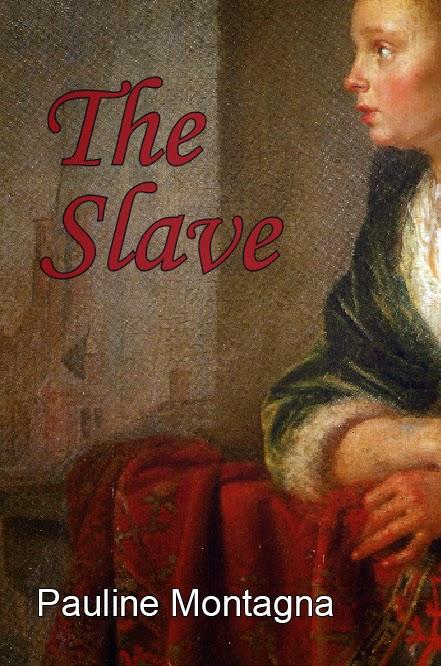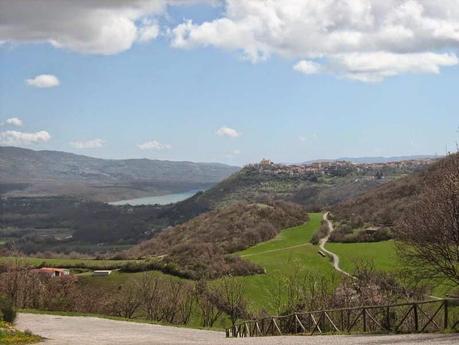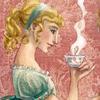 The Slave by Pauline Montagna is the latest historical novel I read and it is a lovely, gripping one. A real page turner. I was first drawn to it by the original love story the author proposes as the main feature in the plot. A young woman from a rich Italian family doomed to obey her father first, then her husband, the man his father chose for her and a slave coming from Asia and serving in her house, a handsome young man with a broken soul and a mysterious past.As Harriet Martineau states in her works about women's rights, slaves and women experienced the same kind of subjection: an absolute luck of equality, no basic rights, no dignity. Is that why Batu and Aurelia feel immediate sympathy for each other? I recommend you this exciting romance if you enjoy reading historical fiction. I'm sure you'll love it. You can get your free copy following the instructions at the end of my interview with the author, Pauline Montagna.
The Slave by Pauline Montagna is the latest historical novel I read and it is a lovely, gripping one. A real page turner. I was first drawn to it by the original love story the author proposes as the main feature in the plot. A young woman from a rich Italian family doomed to obey her father first, then her husband, the man his father chose for her and a slave coming from Asia and serving in her house, a handsome young man with a broken soul and a mysterious past.As Harriet Martineau states in her works about women's rights, slaves and women experienced the same kind of subjection: an absolute luck of equality, no basic rights, no dignity. Is that why Batu and Aurelia feel immediate sympathy for each other? I recommend you this exciting romance if you enjoy reading historical fiction. I'm sure you'll love it. You can get your free copy following the instructions at the end of my interview with the author, Pauline Montagna. *****************************************
First of all, I’d love to know something more about you, Pauline. Did you always want to become a writer?
Although I was born in Australia, all of my grandparents and my mother were born in Italy. My mother was born in the Val d’Agri in Basilicata and came to Australia when she was twelve. My paternal grandfather came to Australia from Isola d’Elba, off the coast of Tuscany, in 1921 and my father was born here. I grew up with a strong Italian identity and studied French, Italian and European history at university.
I went into university planning to become a teacher, but I soon changed my mind and by the time I graduated my ambition was to do something in the creative industries. However, back in my day, it was rather difficult to get into publishing or theater unless you went to the right schools and knew the right people so I had to pursue my dreams rather indirectly and make do with working in amateur theater until I finally landed a job in Australia’s burgeoning film industry in the 1980s. However, unless you have the hide and stamina of a rhinoceros the film industry is not a long term prospect. Eventually I returned to university and got my teaching qualifications after all.
Although I had always dabbled in writing it wasn’t until I returned to study that I realised I had a real aptitude for it, so while I taught English as a Second Language to immigrants, I enrolled part-time in a course in Professional Writing and Editing. My first novel, ‘The Slave’ came out of that course. I came up against the usual obstacles with trying to get my novel published. However, the writing course had also taught me about small press publishing, so I decided to go it alone and self-publish. That was back in 2005. Since then there’s been a revolution in self-publishing and self-promotion, so I’ve decided to give ‘The Slave’ another chance.
Being Italian, my greatest curiosity is, of course, how did you come to write a historical romance set in Italy?

Sunset over Capoliveri , Isola D'Elba - Picture by Pauline Montagna
Being Italian, where else would I begin? But seriously, the setting for ‘The Slave’ came out of my university studies. Although my university was very progressive, there were only two units of Italian history on offer ‘Medieval Italian City States’ and ‘Florence and the Renaissance’. Although I had always been aware of Florence’s role in the Renaissance, I had not really understood that her dynamic culture had grown out of the culture of the Italian city states. Having grown up with the image of Italy as a political and economic basket case, it was gratifying to learn that as far back as the eleventh century Italy was leading the world. What I learned stayed with me so that many years later when I came to attempt my first novel, I chose to set it in that time and place.What kind of research did you carry out to write about that historical context?
Since I had already studied the period and had been thinking about this story for a long time, I didn’t have much basic research to do apart from going back to the books just to refresh my memory. Once I started writing I researched individual topics as they came up, topics such as marriage practices, dance, dress, food, hunting, sword fighting, and, of course, Mongolian warriors. The internet was always useful as a place to start, but I preferred to turn to books for in depth research.
Have you traveled to Italy? What is the best place you visited/your favorite place/town?
I’ve been to Europe four times. On my latest two trips in 2008 and 2013, I spent as much time in Italy as I could manage. In 2008 I focussed on the Etruscans as I’m hoping to write a series about them someday. On that trip I spent most of my time in Tuscany and Umbria visiting ancient Etruscan towns and their museums. However I was waylaid by the need to get back to a series I had already begun on Shakespeare. In 2013 I focussed on Shakespeare in Italy and went to Sicily then up to the north where I traveled overland from Milan to Venice.
With relatives from two different parts of Italy, on my return I’m often asked the totally unfair question of which of my ancestral villages is the best. I can only answer that both are beautiful in their own way. And so is all of Italy. In fact that’s a traveller’s biggest dilemma in Italy. There are so many beautiful places to see but you can’t see them all. However, in 2008 I fell in love with Chiusi, which is a lovely hill-top Etruscan town, in fact I would call it the heart of Etruria. My dream is to live there, learn Etruscan and write about the Etruscans.
Your heroine, Aurelia, is an obedient daughter destined for an arranged marriage to further her father’s political ambitions. Was she inspired by any historical or literary character you read about? Can you tell us something more about her?
Aurelia is not the kind of girl that books are generally written about. She’s just an ordinary girl, raised as most girls would have been at the time. She came out of my own experience of growing up as an Italian girl. Not that my parents had any real intention of arranging my marriage, but I ultimately recognised that I was raised as though they did. A good Italian girl learned to be a good housekeeper, she learned not to be demanding or too self-assured, she dressed modestly and didn’t go out unchaperoned where she might meet strange men or cause gossip. Of course, growing up in Australia in the 1960s and 70s, I rebelled against these rules and to this day I’m the world’s worst housekeeper but most of it stayed with me and formed my character.
Aurelia’s not like most heroines in what is generally called Historical Romance these days. She’s not feisty or sexually adventurous. She doesn’t take on men at their own game. She’s timid and naïve to begin with, but she must face many challenges that her upbringing never prepared her for, challenges she meets with a quiet strength and courage.

Grumento Nova - Italy (picture by Pauline Montagna)
The male hero in your story is a young Asian slave, Batu. What is he like?Batu doesn’t talk much about his past, but from the hints he drops we learn that he starts life as a warrior on the Central Asian steppes. As a young man he is captured and sold into slavery. We can only imagine what kind of abuse he suffers until finally the contents of the galley on which he is imprisoned are sold in the Venetian market place. Aurelia’s father buys him as part of a job lot and brings him into the household. At first he is taunted and bullied by the household servants, but when he proves he can stand up for himself, he is not only accepted by his peers but becomes their leader. As he has a talent with horses he is put to work in the stables, but because of his fighting ability, when the town’s volatile politics turn violent, he also becomes a bodyguard for the woman whenever they leave the house. Although their relationship is discouraged, he and Aurelia form a strong bond from his first arrival in the household which keeps them both going through the vicissitudes of their lives.
Which was the moment/scene of the novel you most loved writing?
I enjoyed the whole experience of writing ‘The Slave’, but perhaps the scene which was the most fun to write was set in the country village where Aurelia’s parents were born and which they visit every year to celebrate their Madonna. On one of their visits, I describe the villagers dancing. The scene is based on my memories of my grandmother dancing the tarantella with our paesani. I didn’t have any tarantella music in my CD collection, but I did have one of Andean music which I played very loudly as I was writing. Little will my readers know that these Italian villagers are dancing the tarantella to the music of the Incas!
Which was instead the hardest to write down?
As a modestly raised Italian girl, the scene I found hardest to write was the sex scene. It was excruciating. In my first draft I skirted around the details, but my workshop group wouldn’t let me get away with that. They had waited until Chapter 42 for some action and they wanted more, thank you very much. So they sent me home to do it all again. I remember prowling about the house all afternoon trying to get into the right frame of mind.
Have you got a writing routine?
If I ever did have a writing routine, it’s been shot to pieces over the last few months as I’ve devoted all of my time and energy to self-promotion. I’m hoping that once ‘The Slave’ is off and running I can get back to what I love best. When I’m in ‘the zone’, so to speak, I can write all day. I’m semi-retired now (which is a nice way to say mostly unemployed) but when I do go out to work it’s usually on a part-time casual basis and mostly in the evening, so I can devote whole days to writing.
What kind of reader are you?
To be honest, I don’t read very much at all these days. Spending the whole day on the computer leaves one eye-sore and tired, so more often than not I fall asleep if I read for pleasure for anything more than half an hour. However, I’m a voracious reader by nature and I prefer books with some substance. I’ve been collecting 19th century classics with the hope that one day I’ll get round to reading them. I also enjoy the novels of the thirties and forties, particularly George Orwell, Robert Graves, Graham Greene and Christopher Isherwood, but I think my greatest loves are the historical novels of Mary Renault and Ursula Le Guin’s fantasy and science fiction.Now it’s time to sell your book. How would you write an ad in about 50 words?
‘The Slave’ is a story of innocence betrayed, enduring love and unrequited passions, set in the sophisticated but violent and volatile world of fourteenth century Italy. Readers have called ‘The Slave’ ‘a gripping period drama’, ‘hard to put down’, ‘entertaining and colourful’ with a heroine who ‘stay[s] with [you] long afterwards’.
Great. That’s all for now, Pauline. Thank you so much for taking the time to answer my questions. Good luck and best wishes for your release and all your future projects!
About the book – The Slave
Aurelia Rubbini, the only child of a rich merchant in fourteenth century Italy, has been raised to be a dutiful daughter, wife and mother, but she longs for something more than the restricted life intended for her. Then one day, her father brings home from a buying trip an Asian slave boy, Batu, who will reshape Aurelia’s destiny.
Aurelia and Batu are inexorably drawn to each other, but their relationship is forbidden as Aurelia is destined for an arranged marriage to further her father’s political ambitions. When Aurelia marries Lorenzo de Graziano, a nobleman with a dangerous reputation, Batu insists on going with her for her protection. But Batu’s presence arouses violent passions that Aurelia, in her innocence, can never understand.
About the author
Pauline Montagna was born into an Italian family in Melbourne, Australia. After obtaining a BA in French, Italian and History, she indulged her artistic interests through amateur theatre, while developing her accounting skills through a wide variety of workplaces culminating in the Australian film industry. In her mid-thirties, Pauline returned to university and qualified as a teacher of English as Second Language, a profession she pursued while completing a Diploma of Professional Writing and Editing. She has now retired from teaching to concentrate on her writing. As well as The Slave, she has published a short story collection, Suburban Terrors.
Read an excerpt
Aurelia stood on the gallery nervously watching the guests arrive for her betrothal ceremony through the gate drawn open in welcome. Servants milled around them and her father came out to greet them as they arrived. Few of them were familiar to her, a handful of close relatives and Father Antonio from the parish church.
The Graziani party of five arrived on horseback while all the other guests, except for the few from the country, had arrived on foot or by chair. They sat their horses with a natural grace. Dismounting in a single smooth movement, they carelessly tossed their reins to the grooms they assumed would be on hand and stood waiting to be greeted. The eldest, no doubt Lord de Graziano himself, was a tall, straight-backed, white-haired man with a full beard. Beside him stood a younger, slightly taller, fair-haired man. This must be Lorenzo. The other three stood apart from their elders, looking about them at the house and exchanging humorous remarks.
They were dressed in the height of fashion, the younger boys in parti-coloured hose, with short, tight, brightly coloured doublets embroidered in gold and silver, and with feathers in their jaunty caps. Their father wore a long, red, woolen tunic over which he wore a fur-trimmed cote-hardie and a flat hat. In comparison, Lorenzo’s costume seemed almost austere. He was bareheaded and wore plain, russet hose, high boots and a thigh-length, copper-brown, gold embroidered doublet.With their magnificent costumes and the casual assurance of their carriage, the Graziani seemed to be creatures of a strange, alien race from a world to which Aurelia feared she could never belong. They made her feel like a child straight from the nursery. And right now, she wanted nothing more than to run away and bury her face in her nurse’s skirts.Her father approached them, bowing deeply and welcoming them to his home. Signor de Graziano accepted his obeisance with barely a nod and introduced him to Lorenzo who accepted his greeting with a shallow, formal bow. The younger sons, introduced with a sweep of their father’s arm, bowed to their host much more courteously.
Aurelia retreated to her room where she could be alone. Rosetta, together with all the other servants in the house, had been commandeered to help prepare and serve the banquet. She sat down for a moment, trying to breathe deeply and keep calm, but she could not. She rose and began to walk about the room, making a pretense of tidying up. Picking up clothes and brushes, she tried to remember where they should go, could not, and put them down again in the same place. Finally she perched on the edge of a wooden stool and waited for her father to collect her.
He had come to see her earlier that morning to make sure that she had been properly prepared.‘Let me have a look at you.’ He walked around her while she stood and the under-maid, pressed into service in Rosetta’s absence, arranged Aurelia’s russet and green skirts around her. ‘Not too bad. We would have been better with something more festive in the dress.’‘If we had had more time, we could have ordered something more appropriate,’ Aurelia replied dryly.
Her father looked at her narrowly. ‘I guess it will do. We will have a more fitting gown made for the wedding. Well, everything seems to be in order. I shall collect you when all is ready below.’He turned to go, but Aurelia dared to call after him.‘Papa…’He turned back reluctantly.‘I have hardly seen you these last few days.’‘I have been extremely busy. There was much to be finalised before the ceremony.’‘Have you nothing to say to me? I am to be married soon.’‘Did your mother not speak to you?’‘Papa…I had hoped…’ Her father looked at her blankly. She felt tears sting her eyes and she bowed her head.
He approached her and raised her chin, bringing her eyes up to meet his. ‘Aurelia, our family’s fortunes depend on this alliance. You hold our future in your hands.’She searched his green eyes, seeking some reassurance, but his look held no tenderness, only a warning.‘I have a lot to do, Aurelia. I shall come for you presently.’ And with that he had left the room.Aurelia heard a footfall behind her and turned, expecting her father. With relief, she saw it was Rosetta, wiping her hands on her apron and with flour on her face.‘No, do not embrace me, child. I shall only get your lovely gown covered in flour. But turn around and let me have a look at you.’ Fortunately, the tear in Aurelia’s gown had been at the seam and Rosetta had been able to mend it with invisible stitches. But her hair, dressed by the under-maids, was not as well finished as Rosetta would have had it. ‘Well, it cannot be helped now, but they will not notice it. They will only have eyes for your lovely face.’Despite her nerves, Aurelia could not help but smile at Rosetta’s partiality and stretched gingerly to give her nurse a kiss.
‘I must get back now. The cook will be screaming for me. But I had to sneak up and get a look at you before the ceremony. I expect I shall be confined to the kitchen all day.’ But before she could leave she took Aurelia’s hands, her kind, round face straining to form a reassuring smile. ‘Carissima figlia mia, they will love you. I know it. They cannot help but love you.’ And with that she left, with, Aurelia suspected, tears in her eyes. Aurelia wiped away her own tears, biting her lip to stop them pouring from her.Messer Rubbini came up soon after. He was wearing a private, triumphant smile. ‘Well, are you ready? Wipe those tears, child. You do not want the Graziani to think you go to them reluctantly, do you?’
As they came out onto the gallery, he took her hand and composed his face into a suitable smile. Aurelia was too nervous to smile and just hoped that her churning stomach would get her through the day without disgracing her.
The guests parted as they approached, opening up a path towards the bower which had been set up in the courtyard for the betrothal ceremony. Father Antonio stood to one side of it, his stole around his neck, smiling complacently. At the lectern, under the bower, stood the notary with the wedding contracts. Before him, Lorenzo stood with his father. Lord de Graziano smiled at Aurelia graciously and she tried to smile in return. Lorenzo was coolly looking her over as she approached.
He stood half a head taller than his father, towering over most of the other men around him. He held his slender, broad-shouldered body tall and straight. His hands were long-fingered, strong and well cared for. His thick, wavy, fair hair was the same sandy color as his tanned skin, and he wore it short except for the lock that fell over his forehead, covering a fading scar. His eyes were a deep blue, surrounded by fine lines. When they met hers, they remained impassive. He was a handsome man, but there was an aloofness about him that made him unreadable, and somewhat forbidding. He was older than Aurelia had expected, not a youth but a grown man, next to whom she felt even more of a child.

